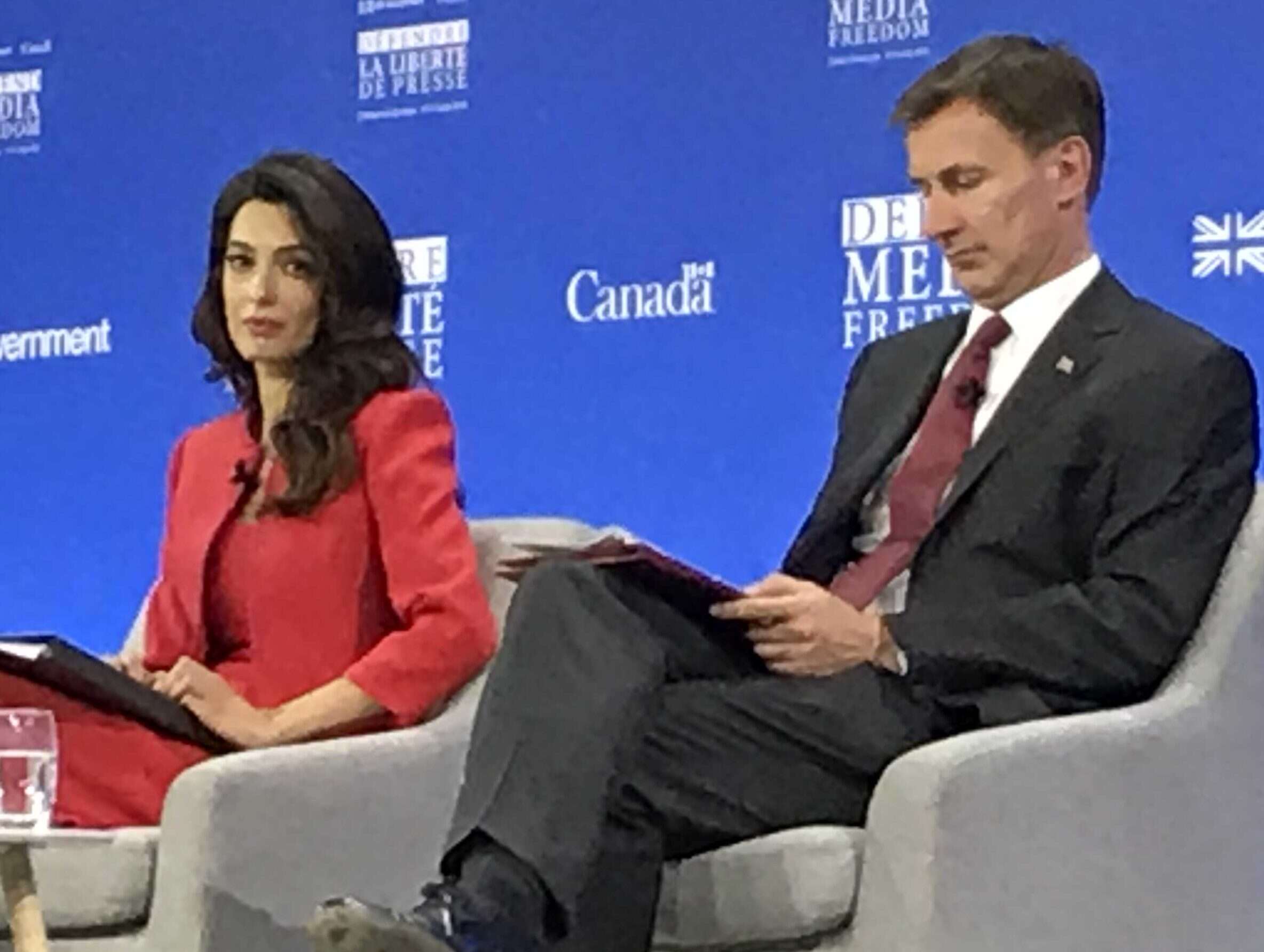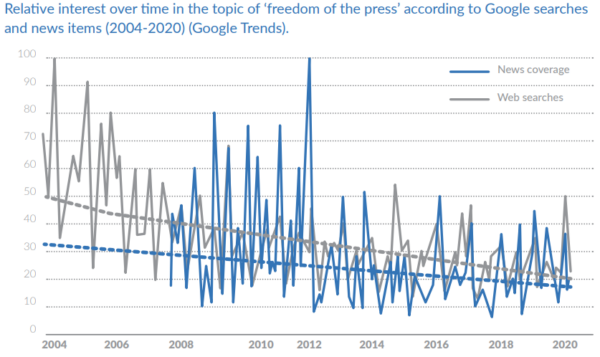
News coverage and Google searches of press freedom issues have fallen over the past 16 years, according to a new report.
The drop in interest from journalists writing about press freedom was “relatively steep” from July 2012 onwards but the decline over time was steadier within Google searches.
This is despite concerns of a global decline in press freedom in recent years, with more than half of the world’s population now said to be living in a country in which freedom of expression is categorised as “in crisis”.
The discovery came from academics at City University and the University of East Anglia as they investigated the impact of the UK Foreign Office-led campaign for media freedom, which included a flagship conference in July last year, on coverage of the issue.
It pointed to peaks and troughs in coverage but said these are largely based around annual events such as World Press Freedom Day on 3 May and the International Day to End Impunity for Crimes Against Journalists on 2 November.
“This indicates that these particular days play a vital role in drawing attention to an issue that ordinarily receives little attention,” the report said.

Interest in press freedom topics in news stories and Google searches. Picture: Shining a Spotlight on Media Freedom? Media coverage of the Global Campaign for Media Freedom report
The academics said there was a widely held yet “largely untested” assumption that media freedom receives relatively low levels of news coverage.
They found the issue in fact received “relatively high” levels of attention in the media compared to similar UN initiatives and more than most other international human rights issues.
The report also noted that a “small number of cases receive the vast majority of coverage”, pointing to the murdered Saudi journalist Jamal Khashoggi.
The Washington Post columnist was mentioned in more than eight times as many news items as all the other nine cases named in the ten most urgent press freedom cases, as defined by the One Free Press Coalition in July 2020, combined.
Yet even Khashoggi received less mentions than George Clooney – the actor husband of the UK’s then-Special Envoy on Media Freedom Amal Clooney – in coverage relating to the UK-led Global Campaign for Media Freedom.
The actor was not involved in the campaign in any way, but was mentioned only because of his own celebrity in 26% of coverage (1,362 news items).
By comparison, Khashoggi was mentioned 1,346 times (25% of coverage) and the United Nations featured 1,096 times (21%).
Clooney was also mentioned in 24% of all coverage of the conference taken alone, but Khashoggi did come higher in this regard (29%).
Amal Clooney was mentioned 50% of the time, while Jeremy Hunt, Foreign Secretary at the time of the conference and the launch of the campaign, appeared in 48% of coverage in the year monitored (both pictured).
Analysis of coverage between July 2019 and June 2020 found World Press Freedom Day received more English-language online news coverage (5,810) and mentions on Twitter (64,412 including retweets) than most other UN-designated international days.
But it received considerably less than World Mental Health Day (18,500 news items and 223,000 tweets), World Aids Day (13,600 and 131,000) and Human Rights Day (10,900 and 318,000).
And days like World Radio Day, the International Day to End Impunity for Crimes against Journalists and World Television Day receive ” relatively little attention”.
The report suggested there was “significant scope” for media freedom to receive more coverage when looking at the number of mentions for the UN’s leading figure on media freedom issues compared to leaders in other areas.
The UN Special Rapporteur for Freedom of Opinion and Expression was mentioned in 3,450 news items and 6,670 tweets compared to 5,120 and 70,700 respectively for the Special Rapporteur for Torture and Other Cruel, Inhuman or Degrading Treatment or Punishment.
The academics’ overall assessment of the campaign was that it had made a “fleeting” impact on international coverage of press freedom issues.
They said: “In its first year, the GCMF has helped to shine a spotlight on media freedom, generating a significant amount of new, online, English-language news coverage and social media commentary.
“Notably, it generated more attention than most other international media freedom initiatives.
“However, this spotlight was fleeting. Media attention was primarily focussed on the inaugural Global Media Freedom Conference in London in July 2019. The GCMF’s other initiatives generated very little online news coverage.”
The findings echo criticism from Sussex University journalism professor Ivor Gaber at last year’s conference when he said there had been a “shameful” amount of coverage of the event and said journalists are “not doing a good job” at raising awareness of press freedom issues in a way that will galvanise public opinion because it is not seen as a “sexy” topic.
He added that journalists “ain’t doing a good job” because of a fear of navel gazing.
A Foreign Office spokesperson told Press Gazette: “The UK is committed to working with partners around the world to promote media freedom and the safety of journalists.
“The Global Coalition for Media Freedom has significantly raised the profile of issues relating to freedom of speech and human rights all over the world in its first year. As co-chair, we continue to support its vital work.”
Canada and Botswana will co-host the second Global Conference for Media Freedom online on 16 November.
Email pged@pressgazette.co.uk to point out mistakes, provide story tips or send in a letter for publication on our "Letters Page" blog
